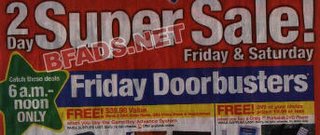Are Sale Leaks Good for the Economy?
by Anonymous We're told on the first day of an econ class that scarcity is everywhere. From the point of view of retailers, nothing is as scarce as a shopper's time on the morning after Thanksgiving. "Black Friday" is the unofficial start of the holiday shopping season, and many people do most (if not all) of their gift shopping on that day.
We're told on the first day of an econ class that scarcity is everywhere. From the point of view of retailers, nothing is as scarce as a shopper's time on the morning after Thanksgiving. "Black Friday" is the unofficial start of the holiday shopping season, and many people do most (if not all) of their gift shopping on that day.Retailers compete for customers in many ways on Black Friday, offering special deals that they advertise to customers via newspaper circulars sent out just before Thanksgiving. The content of these circulars--what is going on sale, and by how much--is a closely guarded secret.
Or was.
Now, Michael Brim, a freshman at Cal Poly in San Luis Obispo, has a web site called http://www.bf2005.com/, which is dedicated solely to finding out about retailers' deals ahead of time, and communicating that information to shoppers. An article in The New York Times about the site has been the most e-mailed Times article since it was published yesterday, and BF2005 has had to respond by preparing a new server cluster to handle all the traffic.
According to the Times article, retailers are responding with threats of legal action. Clearly, they see that they have something to lose by having their secrets revealed. Just as clearly, consumers have something to gain. What is the overall effect on the economy?
The answer is a bit complex, and deserves being thought about closely. To get you started in the right direction, here are some questions you might ask yourself:
1. Perfectly competitive markets are characterized by perfect information. The internet provides much more information than shoppers ever had before. What effect does this have on prices? On firms' profits? On the number of firms operating in the market?
2. In the perfectly competitive model, firms generally produce one good--but think about a retailer that sells many goods. They may offer sales on one good, and even take a significant loss on that good, in the hopes of getting customers into their store on Black Friday so they can sell other goods at full price. What other aspects of the perfectly competitive model no longer apply when firms sell more than one good?
3. If you know a bit of game theory, think about the game that retailers play against each other on Black Friday. Suppose Target plans on selling DVD players for $10 on Black Friday. What is Wal-Mart's best response--offer a sale on the same thing, or something else? What is Target's best response to Wal-Mart's best response? How do the actions of a single college student, Michael Brim, affect the payoffs in this game?



0 Comments:
Post a Comment
<< Home